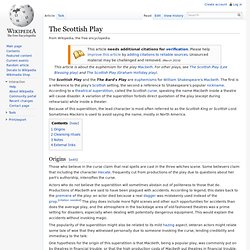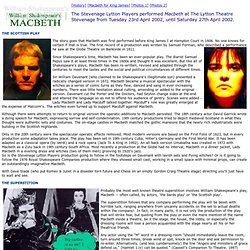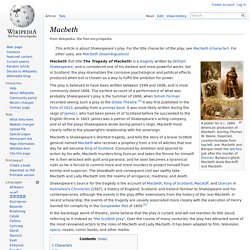

The Scottish Play. The Scottish Play and the The Bard's Play are euphemisms for William Shakespeare's Macbeth.

The first is a reference to the play's Scottish setting, the second a reference to Shakespeare's popular nickname. According to a theatrical superstition, called the Scottish curse, speaking the name Macbeth inside a theatre will cause disaster. A variation of the superstition forbids direct quotation of the play (except during rehearsals) while inside a theater. Because of this superstition, the lead character is most often referred to as the Scottish King or Scottish Lord. Sometimes Mackers is used to avoid saying the name, mostly in North America. Origins[edit] Those who believe in the curse claim that real spells are cast in the three witches scene. Actors who do not believe the superstition will sometimes abstain out of politeness to those that do. The popularity of the superstition might also be related to its mild hazing aspect.
Cleansing rituals[edit] What is the Scottish Play? (with picture) New Page 1. [History] [Macbeth for King James] [Photos 1] [Photos 2] The Stevenage Lytton Players performed Macbeth at The Lytton Theatre Stevenage from Tuesday 23rd April 2002, until Saturday 27th April 2002.

The story goes that Macbeth was first performed before King James I at Hampton Court in 1606. No one knows for certain if that is true. The first record of a production was written by Samuel Forman, who described a performance he saw at the Globe Theatre on Bankside in 1611. Since Shakespeare's time, Macbeth has been an ever-popular play.
Sir William Davenant (who claimed to be Shakespeare's illegitimate son) presented a radically changed version in 1672. Although there were attempts to return to original version the operatic additions to Macbeth persisted. Only in the 20th century were the spectacular operatic effects removed. So is the Stevenage Lytton Players production going to follow in the footsteps on Davenant with lavish sets and flying witches? What's It All About, Shakespeare?: Superstition and The Scottish Play. Despite Macbeth's popularity, it has been dogged by superstition and rumours of curses from its very first production.

The well-worn tradition of actors not saying “Macbeth” is all too familiar. But, from where did the notion of a cursed play arise? Coincidentally, one of the very aspects of the play that proved its popularity is thought to be the origin of a dreadful curse. In the words of Rolf Harris, "can you guess what it is, yet? " Why is Macbeth Considered an Unlucky Play? Rumour has it that Shakespeare used genuine rituals to create the first scene of act IV, in which the audience observes the weird sisters dancing, chanting and mixing a peculiar concoction in their cauldron. Some people believe that the real witches of Shakespeare’s time were displeased with the theatrical representation of their rituals and, subsequently, placed a curse on the play.
Additionally, due to its popularity, Macbeth would often be the play performed by struggling theatre companies. Superstition. Macbeth. A poster for a c. 1884 American production of Macbeth, starring Thomas W.

Keene. Depicted, counterclockwise from top-left, are: Macbeth and Banquo meet the witches; just after the murder of Duncan; Banquo's ghost; Macbeth duels Macduff; and Macbeth. Macbeth (full title The Tragedy of Macbeth) is a tragedy written by William Shakespeare, and is considered one of his darkest and most powerful works. Set in Scotland, the play dramatizes the corrosive psychological and political effects produced when evil is chosen as a way to fulfill the ambition for power. The play is believed to have been written between 1599 and 1606, and is most commonly dated 1606. Characters[edit] Plot[edit] Macbeth and Banquo encounter the witches for the first time The play opens amidst thunder and lightning, and the Three Witches decide that their next meeting shall be with Macbeth.
Despite his success, Macbeth, also aware of this part of the prophecy, remains uneasy. Sources[edit] Date and text[edit] Macbeth. Macbeth: Entire Play. The Tragedy of Macbeth (1971. Don't mention Macbeth - Blackadder - BBC. Macbeth 'The Red King'